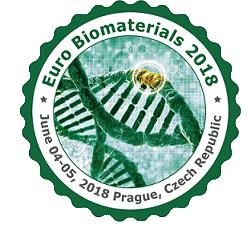
Dongkyu Koo
KIST School, University of Science and Technology, Korea
Title: Enhanced corrosion resistance of biodegradable magnesium using coenzyme
Biography
Biography: Dongkyu Koo
Abstract
Magnesium is essential element in human body and one of the lightest metals, exhibiting good mechanical properties. Recently, there has been a tremendous increase in studies on the development of magnesium implant due to its unique biodegradable property that could reduce the burden of subsequent surgery.However, magnesium has a rapid degradation especially in aggressive chloride environments like body fluid.Accelerated degradation of magnesium can cause the loss of mechanical integrity in a short period which can limit its application as an implant material.Moreover, high amount of hydrogen gas is generated by relatively severe corrosion rates of magnesium. It contributes to the causes of swelling of skin and causes consequent inflammation of soft tissue where is directly in contact with implants. Therefore, there is still concern about the safety of the using biodegradable magnesium alloys.In this study, we analyzed the influence of coenzyme on corrosion behavior of magnesium. The analysis of corrosion rate was held by using Hanks’ balanced salt solution (HBSS) as a simulated body fluid and in condition of 37℃. Thus, with deferring the concentration of the coenzyme used in this study, corrosion rates decreased by 40% in immersion tests. Also, comparable results were obtained in electrochemical tests. Results showed that hydrogen gas produced from corrosion of magnesium can be controlled.

